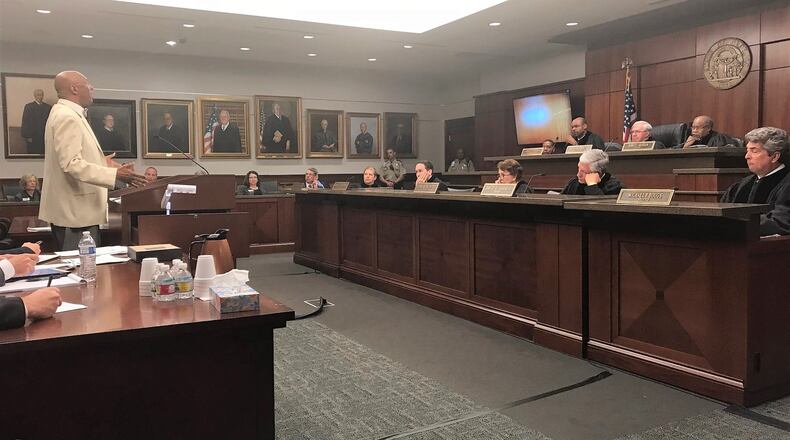DeKalb County’s Board of Ethics, overhauled by voters after years of corruption scandals, faces an uncertain future now that the Georgia Supreme Court has upheld a lower court ruling.
Voters overwhelmingly approved changes in 2015 to make the board more independent by allowing outside groups to appoint a majority of Ethics Board members. That restructuring is unconstitutional, the Supreme Court ruled Monday.
"As these private entities do not answer to the people as required by our Constitution, they are not authorized to wield the power to appoint public officials to the DeKalb County Board of Ethics," Presiding Justice Harold D. Melton wrote.
In backing Superior Court Judge Asha Jackson's April 2017 ruling, Monday's Supreme Court opinion effectively shuts down the board until a new process for appointing four of its seven members is in place. The board also faces questions about whether it should have continued meeting after Jackson's decision and if every decision made since new members were appointed in 2015 is invalid.
Attorney Kurt Kastorf represented the Ethics Board during the legal challenges alongside other attorneys from the Summerville Firm. He said Monday that it will take time to sort out the implications of the ruling but that they could reach beyond DeKalb County because other counties have ethics boards or other commissioners where members are appointed by outside groups.
Kastorf pointed out that 92 percent of DeKalb voters approved the restructuring, which was authorized in a bill approved by the General Assembly and signed by Gov. Nathan Deal.
“There is a strong conviction among both elected officials and citizens alike that there should be an independent board of ethics,” he said.
Former DeKalb Commissioner Sharon Barnes Sutton said Monday’s ruling validates criticisms she had all along about the reconstituted board. She was facing complaints that she misspent public funds when she sued the restructured board, arguing that its members were appointed illegally.
“The way that this board was constituted, it took away the rights of the people who elected their representatives to office to perform for them,” she said. “So, I’m very happy that our citizens have been protected.”
Sutton suggested Monday that the county may not need a Board of Ethics at all. The solicitor general has the power to investigate cases where public officials are accused of breaking the law, she said.
While the solicitor general and district attorney can handle cases involving public officials accused of illegal activities, the Ethics Board can also investigate complaints of misconduct that may not always rise to the level of criminality.
Fixes must either by approved by the Board of Commissioners via ordinance or the DeKalb Legislative Delegation, which would likely also require another voter referendum. Jeff Rader, presiding officer of the DeKalb Board of Commissioners, said commissioners will need legal advice about the implications of the ruling and next steps.
A previous attempt to address the issue during the 2017 General Assembly session failed because the delegation could not reach agreement. That proposal would have allowed outside groups like the DeKalb Chamber of Commerce and Leadership DeKalb to continue recommending Ethics Board members, but lawmakers would have been required to vote on appointments.
Among the critics of that fix and of the 2015 changes to the Ethics Board is state Rep. Vernon Jones, D-Lithonia. On Monday, he posted in a Facebook group that a new direction is needed.
“As many of us expressed before DeKalb County Superior Judge Asha Jackson and today Georgia’s State Supreme Court rulings, the DeKalb County Ethics Board members appointed by private organizations are unconstitutional,” Jones wrote. “I look forward to working with DeKalb’s citizens and our legislative delegation in drafting and passing an ethics bill for DeKalb County that is comprehensive and transparent that is constitutionally sound.”
The leader of the DeKalb County branch of the NAACP issued a statement criticizing the board for continuing to operate after Jackson's ruling.
“We believe that the Ethics Director, Stacey Kalberman, and the DeKalb Ethics Board members should reimburse DeKalb tax payers thousands of dollars that they spent operating illegally, unethically, and in defiance of the Judge’s court order,” President Teresa Hardy said in her statement.
The NAACP had initially asked to be one of the outside groups that made appointments to the board.
Staff writer Mark Niesse contributed to this report.
About the Author
The Latest
Featured



